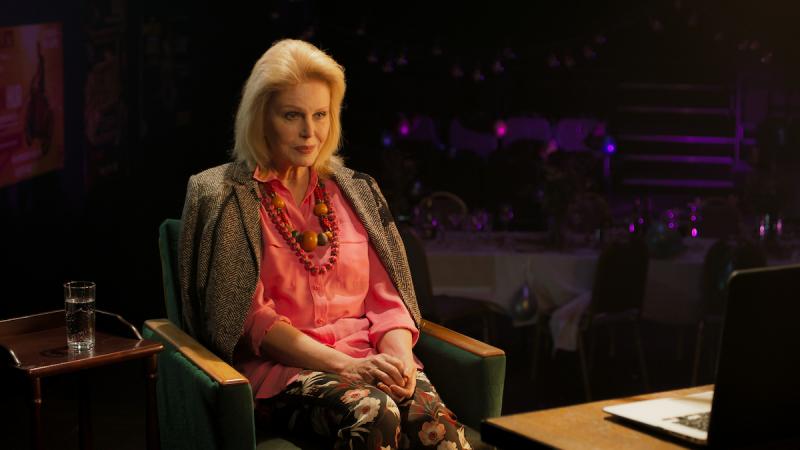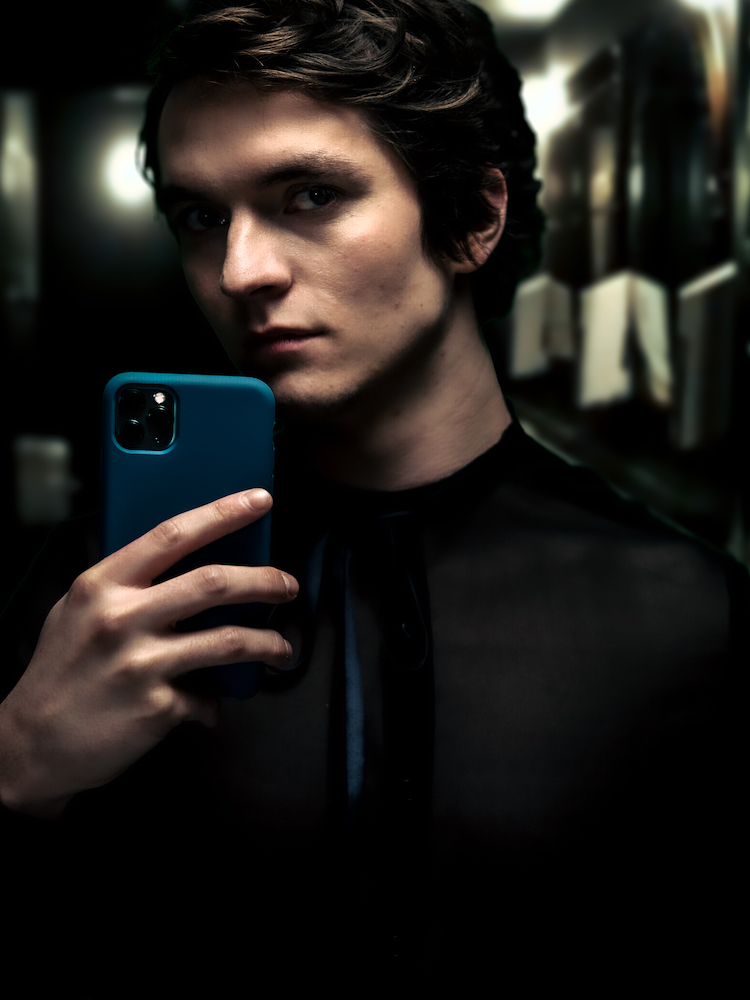The Picture of Dorian Gray, Barn Theatre online review - a dazzling adaptation | reviews, news & interviews
The Picture of Dorian Gray, Barn Theatre online review - a dazzling adaptation
The Picture of Dorian Gray, Barn Theatre online review - a dazzling adaptation
Film version of the Oscar Wilde classic is a brilliant critique of the digital age

Let’s face it, most adaptations of classic novels are disappointingly pedestrian. They are so middle-of-the-road – fancy-dress characters speaking fancy-dress dialogue in fancy-dress plots.
The familiar story is about how the posh boys Basil and Harry form a friendship with the beautiful young Dorian (Whitehead), who is then offered the fantasy gift of eternal youth. But when he falls in love with the actor and singer Sybil, they react negatively and are seemingly proved right when she messes up on stage, and then takes her own life. The tragedy reverberates around the lives of the three men, two of whom end up dead. Director and writer Henry Filloux-Bennett sets this morality tale in the present, and Theatr Clwyd artistic director Tamara Harvey films it using every trick in the digital book. The result is a delicious extravaganza of Zoom, Skype, text, Instagram, TikTok, Snap Chat and YouTube. And more. Much more.
In this world of smartphones and laptops, Filloux-Bennett reverses the original novel’s conceit by having the older techno wizard Basil give Dorian a digital filter that keeps him looking ever youthful online, while his actual body visibly decays with every amoral or selfish act. The theme of how ugly thoughts create ugly faces hooks up with a critical attitude to our society, which so often values appearances more than substance. The obsession with digital validation, with likes and followers, is also echoed by the extreme isolation felt by everyone, but perhaps especially the young, during this pandemic time. It’s a nice touch that Dorian is a second-year Eng Lit student.
 The film’s running time of about 90 minutes means that the ending feels a little rushed, but the framing device – similar to that of What a Carve Up! – of a series of interviews with Lady Narborough (Lumley), a friend of Dorian’s mother, and the smart but heartless bohemian Harry (Alfred Enoch), silkily conducted by Stephen Fry, is both enjoyable and engrossing. Beginning with the – spoiler alert! – death of Dorian and disappearance of Basil, any newcomer can treat the fable as a mystery, although its most mysterious aspect is the wildness of desire. There’s a real sense of polysexual eroticism that pervades the piece. And an uncomfortable feeling of voyeurism: why are we so attracted to watching other people’s misery?
The film’s running time of about 90 minutes means that the ending feels a little rushed, but the framing device – similar to that of What a Carve Up! – of a series of interviews with Lady Narborough (Lumley), a friend of Dorian’s mother, and the smart but heartless bohemian Harry (Alfred Enoch), silkily conducted by Stephen Fry, is both enjoyable and engrossing. Beginning with the – spoiler alert! – death of Dorian and disappearance of Basil, any newcomer can treat the fable as a mystery, although its most mysterious aspect is the wildness of desire. There’s a real sense of polysexual eroticism that pervades the piece. And an uncomfortable feeling of voyeurism: why are we so attracted to watching other people’s misery?
Several themes flash up briefly, like glimpsed text messages or memes on Twitter: the dangerously addictive quality of social media, the power of internet influencers, the prevalence of conspiracy theories and fake news, and, intriguingly, the way that silence can be an active attempt at forgetting. The fact that more young people are keener on social media than on voting is part of the piece’s criticism of the digital age. Most resonant is the metaphor of the viral, both as in “going viral” and as in the pandemic virus. Amid the sexting and the selfies, the traditional trope of the Faustian pact, the selling of one’s soul for earthly pleasures, rubs thighs with insights into our capacity for illusion: must we for ever project our needs onto others?
Filloux-Bennett’s writing respects the essence of the relationships and psychological truths of Wilde’s original, and brings out the essential cruelty of Dorian’s treatment of Sybil, while at the same time throwing him into the world of catfishing, cruising and conspiracy theories. The words blaze with a sense of the contemporary and there’s a nice contrast between the scornful Lady Narborough, the arch Harry and the initially more innocent Dorian. Sybil, who gets a lovely song (by Jared Zeus) to sing at Dorian’s 21st birthday party, is openhearted and vulnerable. The scene in which she messes up on stage is excruciatingly embarrassing. Her subsequent treatment by the men is revoltingly brutal.
A co-production between The Barn and four other theatres, supported by almost 20 partner venues, this is a brilliantly watchable film by Harvey and director of photography Benjamin Collins. Although regulations mean that the characters cannot interact in the same space (except in one scene caught on CCTV), this only intensifies the sense of their spiritual isolation and physical loneliness. Whitehead’s Dorian (pictured above) is perfectly poised and gender fluid, exploring Grindr, languorously flirting with Harry and Basil, and then falling madly in love with Sibyl. Touchingly played by Emma McDonald, she is the most attractive of the characters, posting brief Shakespearean soliloquies – especially those of the Prince of Denmark – on her Insta feed, but always carrying a vulnerability that attracts viciousness like wasps to honey.
While Lumley invests her ladyship with a quasi-regal contempt for ordinary people, she also shows her slight doubts when she denies the terrors of ageing, and insisting that only her best side appears on film. Equally obsessed with beauty, but of the young male variety, Alfred Enoch plays the scornful Harry with enormous panache, at times Wildean in his posing, at other moments seriously rattled by the emotional ups and downs of his relationship with Dorian. Although I felt that Russell Tovey was miscast as the older techie artist Basil, his appearances in the guise of an avatar are a real delight. But it is Whitehead, who descends into the underworld of self-hatred and physical decay, that most impresses, while the filming, with its flashbacks, onscreen texts and YouTube episodes, is a star player in its own right. Although clearly a film rather than a theatre piece, this really is a great adaptation.
rating
Explore topics
Share this article
The future of Arts Journalism
You can stop theartsdesk.com closing!
We urgently need financing to survive. Our fundraising drive has thus far raised £49,000 but we need to reach £100,000 or we will be forced to close. Please contribute here: https://gofund.me/c3f6033d
And if you can forward this information to anyone who might assist, we’d be grateful.

Subscribe to theartsdesk.com
Thank you for continuing to read our work on theartsdesk.com. For unlimited access to every article in its entirety, including our archive of more than 15,000 pieces, we're asking for £5 per month or £40 per year. We feel it's a very good deal, and hope you do too.
To take a subscription now simply click here.
And if you're looking for that extra gift for a friend or family member, why not treat them to a theartsdesk.com gift subscription?
more Theatre
 The Weir, Harold Pinter Theatre review - evasive fantasy, bleak truth and possible community
Three outstanding performances in Conor McPherson’s atmospheric five-hander
The Weir, Harold Pinter Theatre review - evasive fantasy, bleak truth and possible community
Three outstanding performances in Conor McPherson’s atmospheric five-hander
 Dracula, Lyric Hammersmith review - hit-and-miss recasting of the familiar story as feminist diatribe
Morgan Lloyd Malcolm's version puts Mina Harkness centre-stage
Dracula, Lyric Hammersmith review - hit-and-miss recasting of the familiar story as feminist diatribe
Morgan Lloyd Malcolm's version puts Mina Harkness centre-stage
 The Code, Southwark Playhouse Elephant review - superbly cast, resonant play about the price of fame in Hollywood
Tracie Bennett is outstanding as a ribald, riotous Tallulah Bankhead
The Code, Southwark Playhouse Elephant review - superbly cast, resonant play about the price of fame in Hollywood
Tracie Bennett is outstanding as a ribald, riotous Tallulah Bankhead
 Reunion, Kiln Theatre review - a stormy night in every sense
Beautifully acted, but desperately grim drama
Reunion, Kiln Theatre review - a stormy night in every sense
Beautifully acted, but desperately grim drama
 The Lady from the Sea, Bridge Theatre review - flashes of brilliance
Simon Stone refashions Ibsen in his own high-octane image
The Lady from the Sea, Bridge Theatre review - flashes of brilliance
Simon Stone refashions Ibsen in his own high-octane image
 Romans: A Novel, Almeida Theatre review - a uniquely extraordinary work
Alice Birch’s wildly epic family drama is both mind-blowing and exasperating
Romans: A Novel, Almeida Theatre review - a uniquely extraordinary work
Alice Birch’s wildly epic family drama is both mind-blowing and exasperating
 The Producers, Garrick Theatre review - Ve haf vays of making you laugh
You probably know what's coming, but it's such great fun!
The Producers, Garrick Theatre review - Ve haf vays of making you laugh
You probably know what's coming, but it's such great fun!
 Not Your Superwoman, Bush Theatre review - powerful tribute to the plight and perseverance of Black women
Golda Rosheuvel and Letitia Wright excel in a super new play
Not Your Superwoman, Bush Theatre review - powerful tribute to the plight and perseverance of Black women
Golda Rosheuvel and Letitia Wright excel in a super new play
 Cow | Deer, Royal Court review - paradox-rich account of non-human life
Experimental work about nature led by Katie Mitchell is both extraordinary and banal
Cow | Deer, Royal Court review - paradox-rich account of non-human life
Experimental work about nature led by Katie Mitchell is both extraordinary and banal
 Deaf Republic, Royal Court review - beautiful images, shame about the words
Staging of Ukrainian-American Ilya Kaminsky’s anti-war poems is too meta-theatrical
Deaf Republic, Royal Court review - beautiful images, shame about the words
Staging of Ukrainian-American Ilya Kaminsky’s anti-war poems is too meta-theatrical
 Laura Benanti: Nobody Cares, Underbelly Boulevard Soho review - Tony winner makes charming, cheeky London debut
Broadway's acclaimed Cinderella, Louise, and Amalia reaches Soho for a welcome one-night stand
Laura Benanti: Nobody Cares, Underbelly Boulevard Soho review - Tony winner makes charming, cheeky London debut
Broadway's acclaimed Cinderella, Louise, and Amalia reaches Soho for a welcome one-night stand
 The Pitchfork Disney, King's Head Theatre review - blazing with dark energy
Thrilling revival of Philip Ridley’s cult classic confirms its legendary status
The Pitchfork Disney, King's Head Theatre review - blazing with dark energy
Thrilling revival of Philip Ridley’s cult classic confirms its legendary status

Add comment